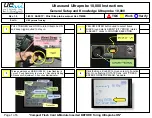
8. Application Notes and Optional Features
Page 182
DMS 2 Operating Manual
Using conventional thickness measurement methods, it is
usually impossible to measure the thickness of a metal part, for
example a pipe, that is covered by some type of coating, such
as paint. Because the thickness of the coating would be part
of the ultrasonic measurement, it would be impossible to
determine the thickness of the base metal without knowing the
precise thickness of the coating.
In many cases, however, measurements of this type are
possible with a Dual-Element probe (HT400A), delay line
probe, CA211A probe and the DMS 2 in a “Multi-Echo” mode
or new TopCOAT Mode. The method, shown in Figure 8-2,
requires at least two high amplitude, multiple backwall echo
signals from the metal part and relatively low amplitude signals
from the interface between the coating layer and base metal.
Delay line probes usually provide the best results in applications
of this type. The low acoustic impedance of the delay line
provides a good impedance match in order to “damp out”
multiple echoes from within the coating layer that would
otherwise interfere with readings.
To calibrate the DMS 2 for measurement of coated parts, using
modes other than the TopCOAT mode, follow the appropriate
procedure in Chapter 3. Although the procedure is the same,
special attention must be given to the echo signals caused by
the coating/metal interface shown in the illustration. GAIN,
DELAY, and parameters for both gates must be set to assure
that the first echo in gate A is the first triggered backwall echo
from the metal part, and that the echo that triggers the mea-
surement in gate B is the second backwall echo. In some
cases it may be necessary to use the second and third
backwall echoes to trigger the measurement.
To perform thickness measurements on coated parts, follow
the procedures in Chapter 4 for measurement modes other
than TopCOAT, or refer to the next section on the TopCOAT
probe.
















































